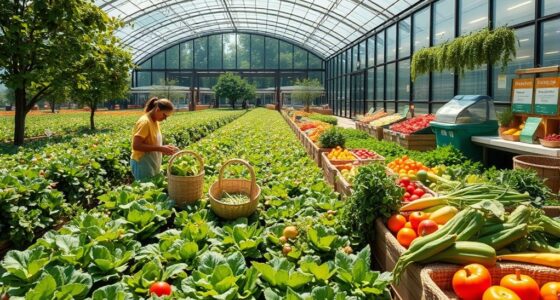Starting composting at home is easy! First, choose a sunny spot for your compost bin and decide on a method that fits your space. Gather kitchen scraps, yard waste, and brown materials like paper or leaves. Mix them in your bin, turning every couple of weeks to aerate. Keep it moist but not soggy. In about 3 to 6 months, you'll have rich compost ready for your garden. Let's uncover more tips for successful composting!
Key Takeaways
- Choose a composting method that suits your space, such as aerobic, vermicomposting, or in-vessel systems based on your needs and resources.
- Set up your compost bin in a sunny location on bare soil, ensuring easy access to water for maintaining moisture levels.
- Incorporate a balanced mix of greens and browns, and turn the compost every couple of weeks to aerate and enhance decomposition.
- Monitor the moisture with the squeeze test and use a compost thermometer to maintain temperatures between 130°F and 160°F for effective breakdown.
- Use the finished compost to enrich your garden soil, suppress weeds, and promote healthier plant growth while contributing to local sustainability efforts.
Understanding the Benefits of Composting

When you start composting at home, you'll quickly discover a range of benefits that not only help the environment but also enhance your garden and community.
Composting reduces the waste you send to landfills, effectively cutting down on greenhouse gas emissions. By decomposing organic materials aerobically, it prevents methane production, making your contribution to a healthier planet significant. Additionally, it promotes mindful practices that encourage conscious consumption and reduce excess waste. Furthermore, implementing composting can lead to a reduction in landfill waste, thus supporting local waste management efforts. The environmental impact of composting can be compared to AI-enhanced waste management, which also seeks to optimize waste reduction and resource utilization.
Moreover, compost enriches your soil with essential nutrients, improving its structure and moisture retention. This leads to stronger plants that naturally resist diseases and pests.
Composting fosters community awareness about sustainable practices and waste management, bringing people together in a shared effort to protect the environment. By incorporating compost into your gardening routine, you can extend your gardening season and enjoy a more productive yield.
Embracing composting truly benefits both you and your local ecosystem.
Choosing the Right Type of Composting
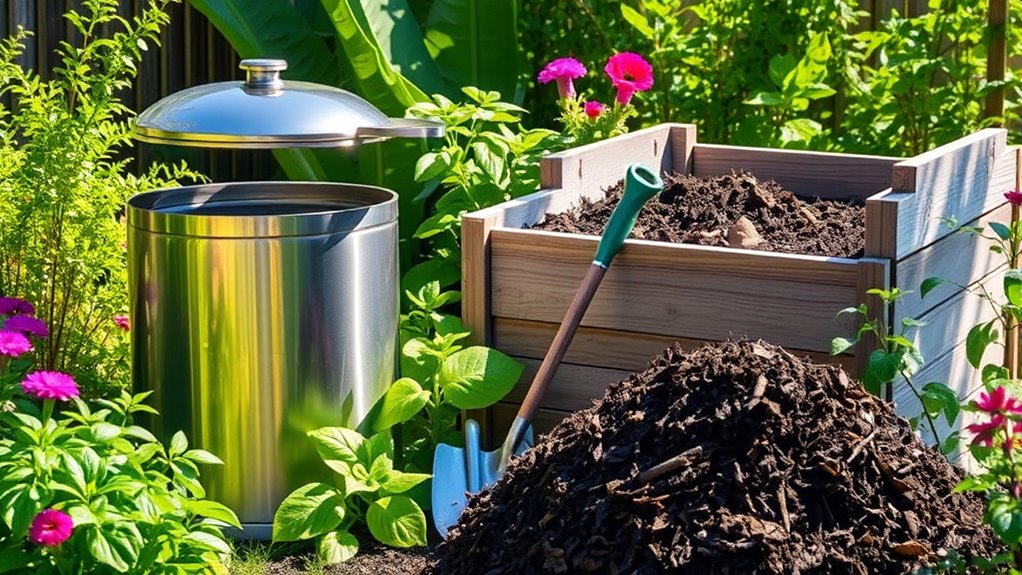
Composting offers numerous benefits, so it's important to choose the right method that suits your needs and environment.
If you have ample backyard space, consider aerobic methods or windrow composting, which require regular turning but yield faster results. This method mirrors the communal dining experience found in traditional Eritrean cuisine, where ingredients are blended together for enhanced flavors. These methods also align with sustainable practices that emphasize resource efficiency. Additionally, these methods can contribute to mental clarity, as engaging in outdoor activities like composting can promote relaxation and reduce stress.
For smaller areas or indoor use, vermicomposting is ideal, as it uses worms to break down organic matter without strong odors.
If you want a more controlled environment, in-vessel composting processes waste quickly while minimizing space.
While anaerobic composting is less popular due to methane production, it requires less maintenance.
Evaluate your space, budget, and time commitment to find the best composting method that aligns with your lifestyle and environmental goals. Additionally, consider incorporating natural materials like kitchen scraps and yard waste to enhance your compost mix.
Setting Up Your Compost Bin

Setting up your compost bin is essential for successful composting, and choosing the right location can make all the difference.
Place your compost bin in a sunny spot on bare soil to facilitate decomposition while ensuring it's easily accessible for adding materials and removing finished compost. If you're in a warmer climate, partial shade can help prevent drying out. Additionally, a well-placed bin can contribute to a clutter-free space that enhances the overall organization of your yard. Creating a minimalist environment around your compost setup can further promote relaxation and clarity. Incorporating organic materials like kitchen scraps and yard waste can accelerate the composting process.
Position your bin near a water source to maintain moisture levels. Depending on your backyard size, you might choose between a bin or a compost pile.
You can build a low-cost bin using pallets or opt for more structured options like wood-and-wire units or tumblers, especially if space is limited. Additionally, consider incorporating composting techniques that can enhance the efficiency of your composting process.
Materials You Can Compost
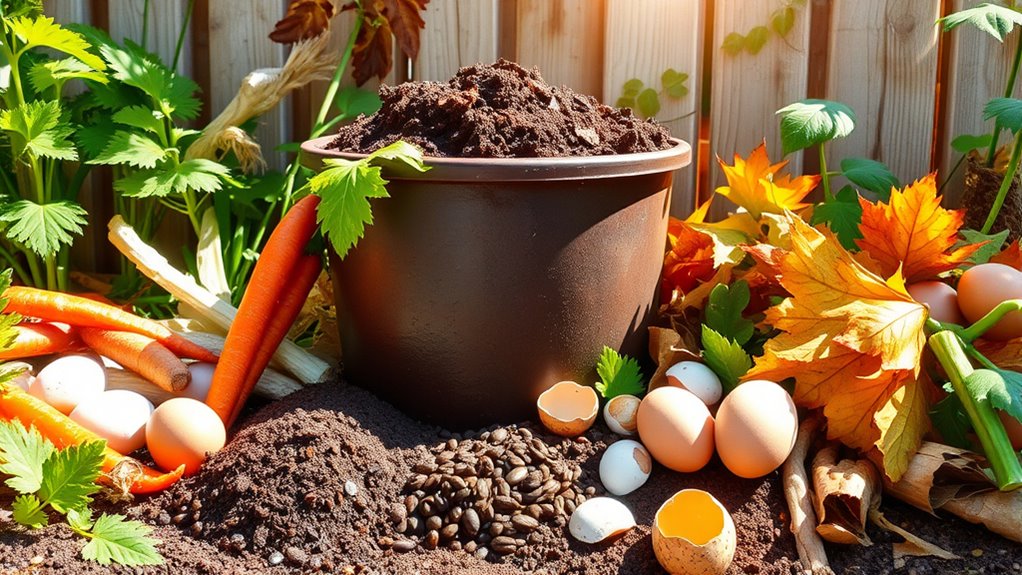
While you may think about what to throw away, it's equally important to consider what you can compost to create rich, nutrient-dense soil.
Start with kitchen scraps like fruit and vegetable peels, coffee grounds, tea leaves, and crushed eggshells. You can also toss in bread and cooked noodles. Composting at home can be a great way to practice sustainable camping principles even in your backyard. Daisy varieties like Shasta and Gerbera can thrive in nutrient-rich soil. Adding organic materials can significantly enhance the composting process and improve soil health.
In your garden, use fresh grass clippings, dead leaves, and spent plants—just avoid any diseased ones.
Add shredded paper, cardboard, and paper towel rolls for carbon. If you have pets, their herbivore manure and small pet droppings are excellent additions too.
Don't forget about seaweed, wine corks, and even old herbs.
Additionally, creating a compost pile can provide a sense of emotional resilience similar to how individuals cope with challenging relationships.
With these materials, you'll build a thriving compost pile that nourishes your garden!
Tips for Maintaining Your Compost Pile
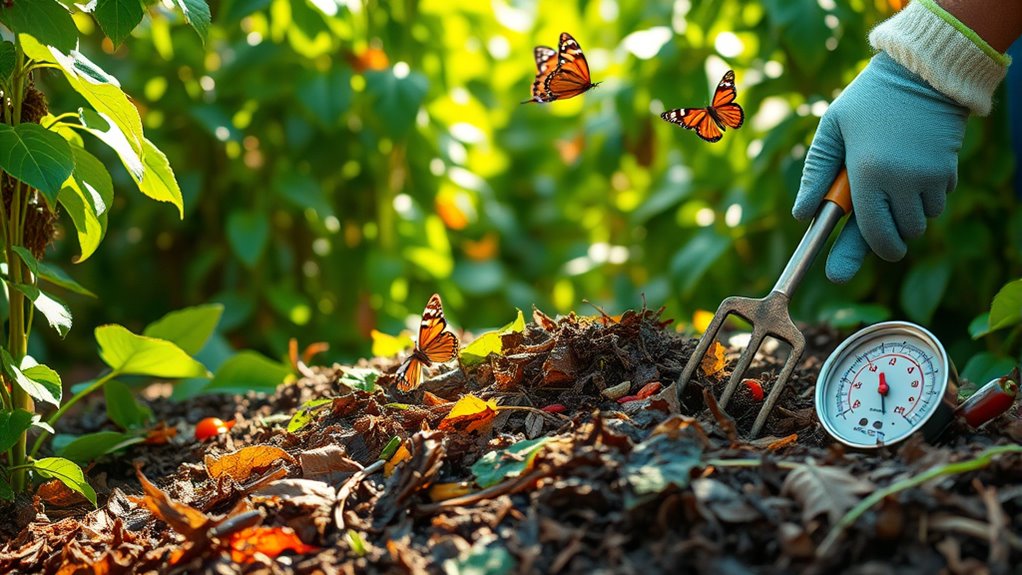
Building a rich compost pile is just the beginning; maintaining it's key to reaping the benefits.
Regularly turn your compost every couple of weeks to aerate and speed up decomposition. Monitor moisture levels with the squeeze test; the compost should feel like a wrung-out sponge. If it's too dry, use a soaker hose or turn the pile to re-wet it, but avoid overwatering. Incorporating native species into your compost can enhance soil health and support local wildlife. Additionally, adding frozen yogurt byproducts, such as whey or fruit scraps, can provide nutrients and improve the microbial activity in your compost. Maintaining a balanced mix of greens and browns is essential for effective composting.
Turn your compost every few weeks and check moisture levels to ensure optimal decomposition.
Keep an eye on temperature with a compost thermometer; a hot pile should reach 130°F to 160°F. If you notice bad odors, add more browns to balance moisture and air. Composting reduces waste and can significantly improve your garden's soil health.
Secure your bin to prevent pests and adjust thickness based on the carbon-to-nitrogen ratio for optimal breakdown.
Happy composting!
Harvesting Your Finished Compost
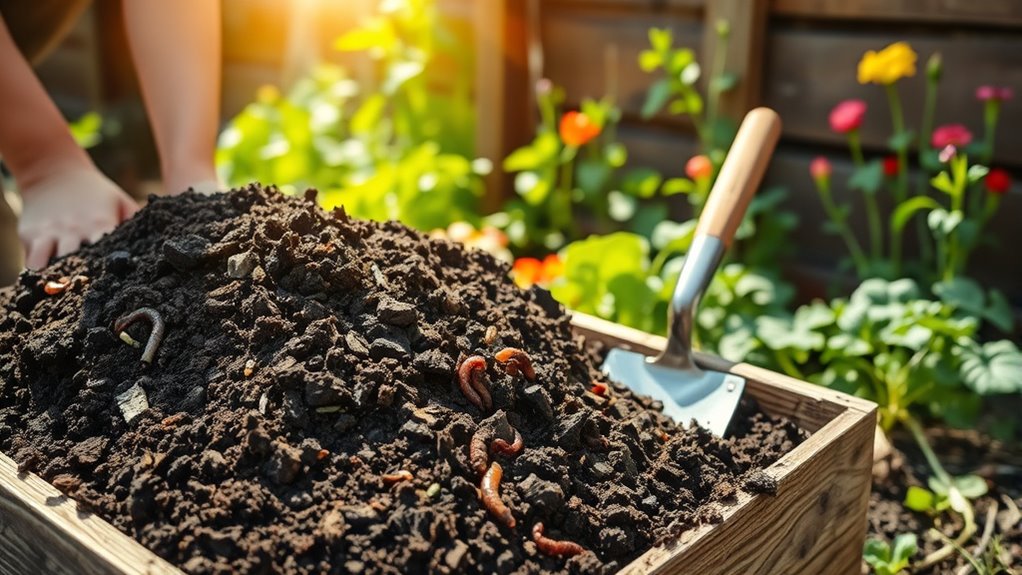
Once your compost pile has matured, it's time to harvest the nutrient-rich material you've created.
Look for dark, loamy compost that smells earthy, feels crumbly, and shows most materials fully decomposed. Use a shovel to move the compost to a separate area, or try a compost corkscrew for deeper extraction. Incorporating regular grooming into your composting process can enhance the quality of the finished product. Regular monitoring of your compost can also ensure optimal airflow, improving the decomposition process.
If you have larger pieces, sift through the compost with a sifter to ensure a smooth texture. You can also utilize bins with openings for easier access.
Remember, mature compost typically takes 3 to 6 months to develop, so monitor your pile regularly. Regular monitoring can also help prevent pest infestations that could disrupt the composting process.
Once harvested, screen any remaining debris and store the compost in a dry place until you're ready to use it.
Ways to Use Compost in Your Garden
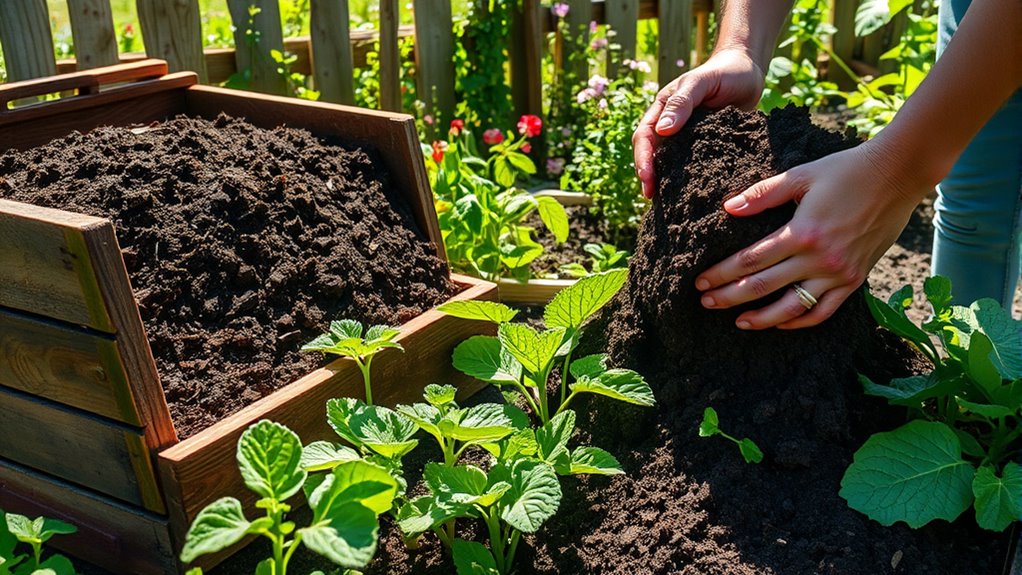
Compost is a gardener's secret weapon, transforming your soil and boosting plant health. By enriching your soil, compost adds essential nutrients that plants crave, improving fertility and structure. This not only helps retain water but also promotes beneficial microbial activity, enhancing your garden's ecosystem.
You can use compost as mulch to suppress weeds and retain moisture, or apply a thin layer as topdressing to improve soil health. Mixing sifted compost into your flower and vegetable beds fosters better seedling development and enhances growth.
Plus, it can deter pests while reducing the need for frequent watering. With compost in your garden, you're not just nurturing your plants but also practicing sustainable gardening that benefits the environment.
Getting Involved in Community Composting
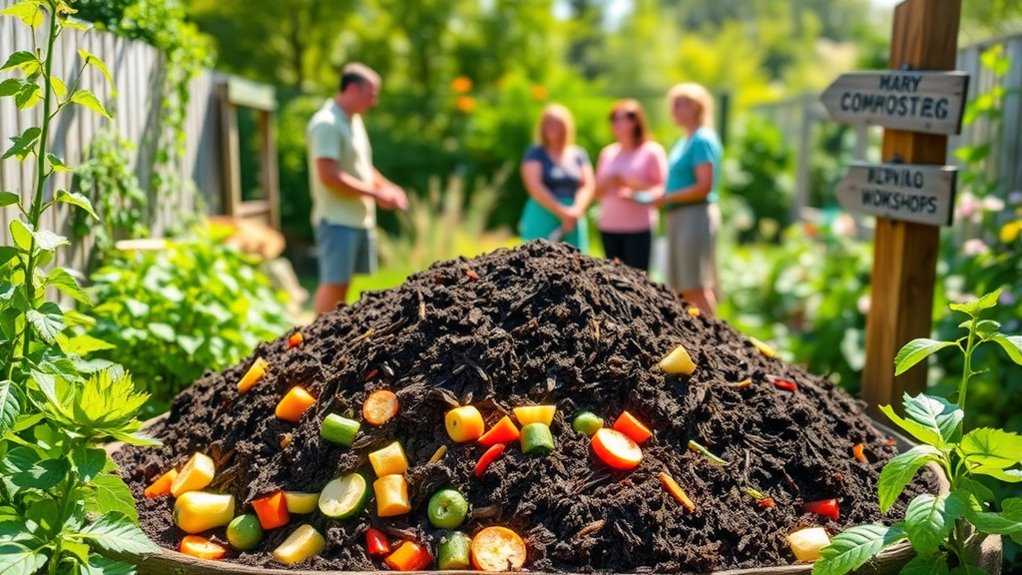
Engaging in community composting can amplify the benefits of composting at home. By participating in local initiatives, you'll help divert organic waste from landfills, reducing greenhouse gas emissions while enriching local soil health.
These programs often offer educational opportunities, like school field trips, fostering community engagement and social support networks. You might also find volunteering or job training opportunities that empower you and your neighbors.
Plus, supporting community composting strengthens local economies by creating green jobs and keeping resources within the area. To get involved, drop off your food scraps at designated sites, advocate for new initiatives, or connect with local organizations.
Frequently Asked Questions
How Long Does It Take to Start Seeing Compost Results?
You can start seeing compost results in as little as a few weeks with hot composting, but it may take longer depending on your method.
If you're using the cold composting method, expect to wait one to two years for finished compost.
Worm composting typically delivers results in about 3-6 months.
Factors like material size, moisture, and oxygen levels can all influence how quickly your compost breaks down.
Can I Compost During Winter Months?
Yes, you can definitely compost during winter months!
To keep your compost pile active, insulate it with straw bales or blankets, and ensure it's at least 3x3x3 feet for better heat retention.
Balance your greens and browns, and monitor moisture levels—keep it moist but not soggy.
While you might turn it less often, look for steam to know it's working.
With the right care, winter composting can yield rich soil for spring!
What Pests Should I Watch for in Compost?
When you dive into the world of composting, you might encounter some uninvited guests.
Keep an eye out for stable flies and houseflies, which love moist organic matter. You may also spot curious raccoons or mice seeking tasty scraps.
But don't worry; beneficial insects like earthworms and red worms are here to help!
Is Composting Safe for Pets?
Composting can be safe for pets, but you need to take precautions.
Ensure your compost bin is secure and keep toxic items, like onions and garlic, out of it.
Monitor your pets around the compost area to prevent them from digging through it.
If you consider composting pet waste, use specialized composters and handle it carefully to minimize health risks.
Regular maintenance helps keep the compost safe and odor-free for your furry friends.
Can I Compost Garden Weeds?
Sure, go ahead and invite those rebellious garden weeds to the compost party!
Just remember, it's not a free-for-all. You've gotta ensure those pesky seeds and roots are dead—nobody wants them crashing the compost again!
Hot composting's your best bet for this, reaching temperatures above 145°F.
So, prepare them right, avoid the invasive ones, and soon you'll have rich compost instead of a weed revival show!
Enjoy your eco-friendly gardening!
Conclusion
Composting at home is like planting seeds for a greener future. By turning your kitchen scraps and yard waste into nutrient-rich gold, you're not just nourishing your garden but also nurturing the planet. With a little patience and care, you'll watch your compost transform, just like a caterpillar becoming a butterfly. So, roll up your sleeves, dive in, and let nature work its magic. You're not just composting; you're cultivating a sustainable lifestyle!




